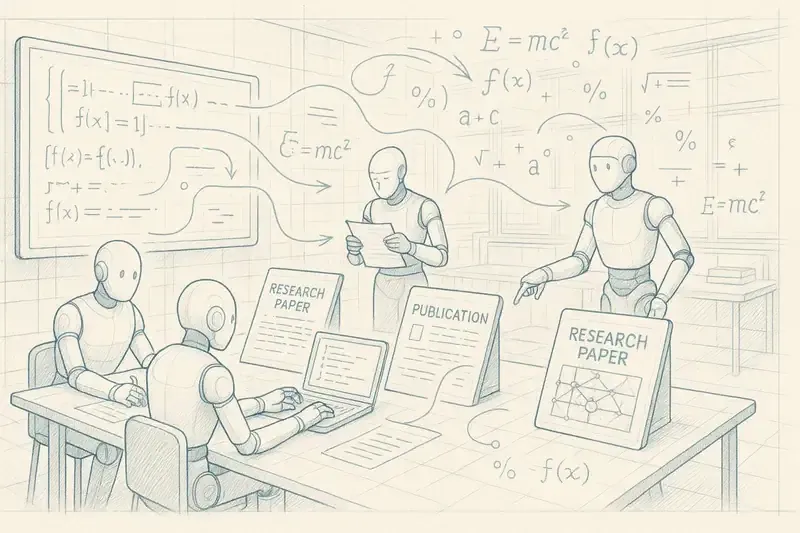
Here are the top 5 most relevant AI papers from arXiv week 46/2025, complete with analysis and insights.
Publications at a Glance
Rethinking Visual Information Processing in Multimodal LLMs Dongwan Kim, Viresh Ranjan, Takashi Nagata, Arnab Dhua, Amit Kumar K C | 11/13/2025
Scalable Synthesis of distributed LLM workloads through Symbolic Tensor Graphs Changhai Man, Joongun Park, Hanjiang Wu, Huan Xu, Srinivas Sridharan, Tushar Krishna | 11/13/2025
Reasoning with Confidence: Efficient Verification of LLM Reasoning Steps via Uncertainty Heads Jingwei Ni, Ekaterina Fadeeva, Tianyi Wu, Mubashara Akhtar, Jiaheng Zhang, Elliott Ash, Markus Leippold, Timothy Baldwin, See-Kiong Ng, Artem Shelmanov, Mrinmaya Sachan | 11/9/2025
Self-Evaluating LLMs for Multi-Step Tasks: Stepwise Confidence Estimation for Failure Detection
Key Insights
This research introduces a novel approach to confidence estimation in large language models by extending self-evaluation techniques to multi-step reasoning tasks, addressing a significant gap in prior methods that primarily focus on single-step outputs. The findings reveal that stepwise evaluation is more effective than holistic scoring in error detection, achieving a notable improvement in performance metrics.
Potential Impact
By enhancing the reliability and trustworthiness of LLMs in high-stakes applications, this research could significantly influence their deployment in critical areas such as healthcare, law, and finance, where multi-step reasoning is essential. The practical framework for failure detection established here may lead to broader acceptance and integration of LLMs in complex decision-making processes.
Rethinking Visual Information Processing in Multimodal LLMs
Key Insights
This research introduces LLaViT, a novel architecture that enhances the integration of visual information in multimodal large language models by allowing them to function as both language and vision encoders. Key modifications, such as separate QKV projections for vision and bidirectional attention on visual tokens, lead to significant performance improvements over existing models like LLaVA.
Potential Impact
LLaViT's innovative approach could transform current methodologies in vision-language tasks, enabling more sophisticated applications in areas such as robotics, autonomous systems, and human-computer interaction. By effectively bridging the gap between text and visual modalities, this research may pave the way for more intuitive and capable AI systems that understand and generate multimodal content.
Scalable Synthesis of distributed LLM workloads through Symbolic Tensor Graphs
Key Insights
This research presents STAGE, a novel framework that synthesizes high-fidelity execution traces for large language model (LLM) workloads, enabling detailed modeling of distributed workload execution. Its ability to support a wide range of parallelization strategies and scale to 32K GPUs represents a significant advancement in the optimization of LLM training and inference.
Potential Impact
By providing a scalable and adaptable method for modeling LLM workloads, STAGE could democratize access to advanced optimization techniques, allowing researchers and developers without access to large-scale infrastructure to explore innovative LLM architectures. This may lead to more efficient training and deployment of AI models, ultimately accelerating advancements in the field of machine learning.
Reasoning with Confidence: Efficient Verification of LLM Reasoning Steps via Uncertainty Heads
Key Insights
This research introduces a novel method for verifying the reasoning steps of large language models (LLMs) using lightweight uncertainty quantification heads (UHeads), which significantly reduce computational overhead compared to existing verification methods. By effectively leveraging the internal states of LLMs to assess reasoning uncertainty, this approach enhances the interpretability and efficiency of multi-step reasoning tasks.
Potential Impact
The proposed UHeads could transform how LLMs are utilized in various applications by making reasoning verification more accessible and less resource-intensive, thus enabling broader deployment in real-world scenarios. This innovation may lead to more reliable AI systems capable of tackling complex tasks across diverse domains, ultimately advancing the field of AI interpretability and trustworthiness.
 AiBrain
AiBrain